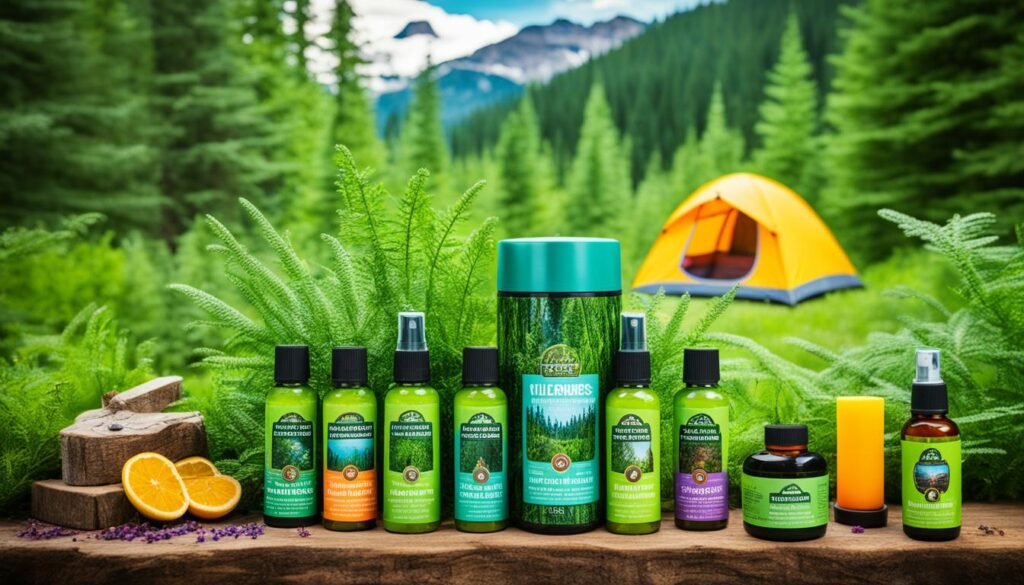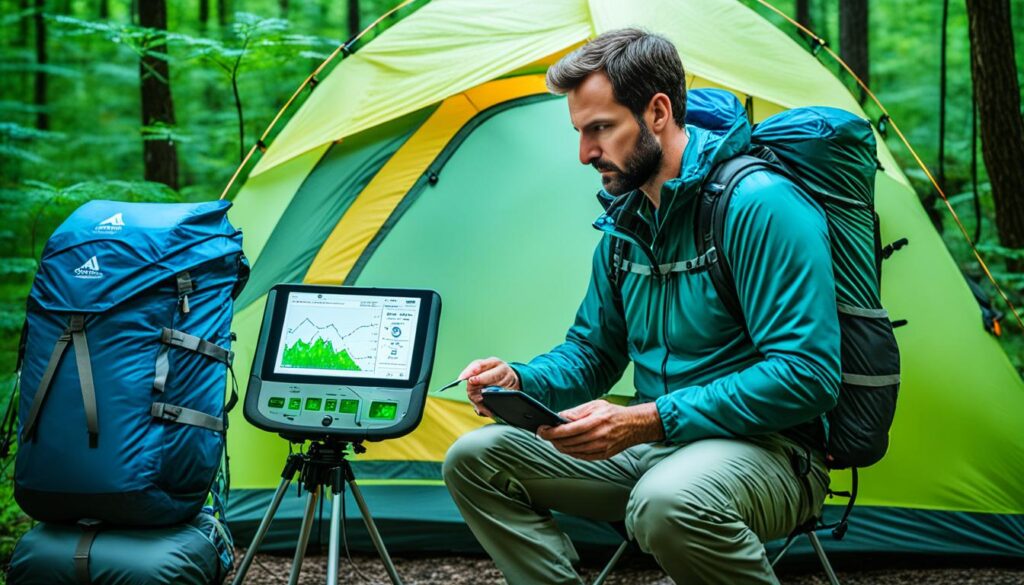When I go camping outdoors, the last thing I want to deal with is pesky bugs. Mosquitoes buzzing around my head, ticks hiding in the grass, and flies interrupting my peaceful moments in nature – it can be quite frustrating. That’s why I’ve discovered the power of natural bug repellents that can keep these insects at bay and allow me to enjoy my camping trip without worry.
Now, you might be wondering, what is the best bug repellent for camping? Well, the answer lies in the natural way to keep bugs away when camping. There are various effective methods and ingredients that you can use to control bugs and ensure insect protection during your camping adventure.
One of the key advantages of natural bug repellents is that they are safe and gentle on the skin, unlike chemical-laden products that can often cause irritation. Furthermore, natural bug prevention for camping is also environmentally friendly, making it a responsible choice for outdoor enthusiasts.
Key Takeaways:
- Using natural bug repellents ensures a bug-free camping experience.
- Natural bug repellents are safe and gentle on the skin.
- They are environmentally friendly and a responsible choice for outdoor enthusiasts.
- By using natural bug repellents, you can enjoy your camping trip without the annoyance of bugs.
- Stay protected and enjoy the great outdoors while keeping bugs at bay.
Common Natural Ingredients for Bug Repellents
When it comes to keeping bugs away, natural ingredients can be highly effective. Here are some of the most common natural ingredients used in bug repellents:
- Citronella: Extracted from the citronella plant leaves, citronella oil has a strong smell that bugs dislike. It is commonly used in candles and lotions to repel mosquitoes and other insects.
- Lemon eucalyptus oil: Derived from the leaves of the lemon eucalyptus tree, this oil has been found to be effective against mosquitoes. It contains a compound called PMD (p-menthane-3,8-diol) that acts as a natural repellent.
- Neem oil: Neem oil is derived from the seeds of the neem tree and has been used for centuries in natural pest control. It has insecticidal properties and can repel a wide range of insects, including mosquitoes and ticks.
- Peppermint oil: Known for its refreshing scent, peppermint oil is also a powerful bug repellent. Its strong aroma masks the scent that attracts insects, making it a popular choice for natural repellent sprays.
- Garlic: While garlic may be known for its culinary uses, it can also repel bugs. The strong odor of garlic acts as a deterrent for mosquitoes, flies, and other insects.
- Lavender: Lavender is not only prized for its calming properties but also for its ability to repel mosquitoes and moths. The fragrance of lavender can help keep bugs away while adding a pleasant scent to your camping experience.
- Coconut oil: Besides being moisturizing for the skin, coconut oil has insect-repelling properties. It can create a barrier on the skin that deters insects from landing and biting.
These natural ingredients can be found in various bug repellent products or used to create your own DIY bug repellents. They provide an effective alternative to conventional chemical-based repellents while ensuring a more eco-friendly camping experience.

DIY Bug Repellent Recipes
If you prefer to make your own bug repellent, there are several DIY recipes that you can try. Making your own bug repellents not only allows you to control the ingredients, but it can also be a fun and rewarding activity during your camping trip.
DIY Citronella Candle
If you enjoy the soothing glow of a candle while keeping bugs away, a DIY citronella candle is a perfect choice. To make this candle, you will need:
- Beeswax
- Citronella oil
Melt the beeswax in a double boiler and then add a few drops of citronella oil. Stir well and pour the mixture into a candle container. Let it cool and solidify before lighting it up. The pleasant scent of citronella will help repel bugs, allowing you to enjoy bug-free evenings by the campfire.
DIY Lemon Eucalyptus Spray
A DIY lemon eucalyptus spray is another effective bug repellent option. To make this spray, you will need:
- Lemon eucalyptus oil
- Water
- Spray bottle
Combine a few drops of lemon eucalyptus oil with water in a spray bottle. Shake well to mix the ingredients thoroughly. Spray the solution onto your skin and clothing to keep bugs at bay. Lemon eucalyptus oil has been proven to be an effective natural repellent against mosquitoes and other pesky insects.
DIY Neem & Coconut Lotion
If you prefer a bug repellent lotion, a DIY neem and coconut lotion is a great choice. To make this lotion, you will need:
- Neem oil
- Coconut oil
Mix equal parts neem oil and coconut oil together. Apply the lotion to your exposed skin to create a barrier against bugs. Neem oil has insect-repellent properties, while coconut oil moisturizes and soothes the skin. This homemade lotion will keep you protected and nourished during your camping adventure.

These DIY bug repellent recipes are simple yet effective ways to keep bugs away while camping. Whether you choose the citronella candle, lemon eucalyptus spray, or neem and coconut lotion, you can enjoy bug-free outdoor activities without harsh chemicals. Give these recipes a try and have a pleasant and mosquito-free camping experience.
Additional Natural Tips for Keeping Bugs Away
In addition to using bug repellents, there are other natural tips and strategies that can help keep bugs away when camping. These simple yet effective methods can enhance your outdoor experience and ensure a bug-free camping trip.
Avoid Stagnant Water: Mosquitoes breed in stagnant water, so it’s important to avoid areas with stagnant water when setting up your campsite. Be sure to empty any containers or areas where water can accumulate, such as buckets, flower pots, or rainwater collection systems.
Colors to Avoid: Did you know that some colors can attract mosquitoes? Avoid wearing bright and dark colors like red, orange, and black, as these colors are more attractive to mosquitoes. Instead, opt for light-colored clothing in shades of green, purple, blue, or white, which may help deter mosquitoes.
Set Up a Fan: Create a gentle breeze and keep bugs away by setting up a fan in your camping area. Bugs, including mosquitoes, are not strong fliers and can be deterred by the airflow created by a fan. Place the fan strategically to maximize its effectiveness in keeping bugs at bay.
Use Mosquito Nets: Invest in mosquito nets for your sleeping area or invest in camping gear that comes with built-in mosquito netting. Mosquito nets act as physical barriers, preventing insects from entering your sleeping space and providing you with a bug-free rest.
Check Mosquito Forecast: Stay up to date with the mosquito forecast in your camping location. Many websites and apps provide this information, allowing you to plan and prepare accordingly. By checking the mosquito forecast, you can be aware of peak mosquito activity and take necessary precautions to avoid mosquito bites.
By following these additional natural tips, you can significantly reduce the annoyance of bugs and enjoy a peaceful and bug-free camping experience. Remember, avoiding stagnant water, wearing the right colors, using a fan, utilizing mosquito nets, and staying informed about the mosquito forecast can make a big difference in keeping bugs away while you camp.
Colors that Attract and Deter Mosquitoes
| Colors | Attract Mosquitoes | Deter Mosquitoes |
|---|---|---|
| Red | ✔ | |
| Orange | ✔ | |
| Black | ✔ | |
| Green | ✔ | |
| Purple | ✔ | |
| Blue | ✔ | |
| White | ✔ |
Note: The table showcases colors that are attractive to mosquitoes, as well as colors that may help deter mosquitoes.

Tips for Tick Prevention
When camping outdoors, ticks can pose a significant concern. Taking precautionary measures to prevent tick bites is crucial for a safe and enjoyable camping experience. Here are some tips to help you keep ticks at bay:
- Wear long sleeves and pants: Covering your skin with long clothing can help create a barrier against ticks. Opt for lightweight and breathable fabric to stay comfortable.
- Tuck pants into socks: Tucking your pants into your socks or boots can prevent ticks from crawling up your legs.
- Use tick repellent: Apply a tick repellent specifically designed for camping to exposed areas of your skin. Look for products that contain ingredients like DEET or picaridin.
- Check for ticks regularly: Conduct thorough tick checks on yourself, your camping gear, and your pets. Pay close attention to areas such as the hairline, underarms, groin, and behind the knees.
- Remove ticks properly: If you do find a tick attached to your skin, use fine-tipped tweezers to grasp it as close to the skin’s surface as possible and pull it straight out with steady pressure. Avoid twisting or squeezing the tick.
By following these tips, you can significantly reduce the risk of tick-related illnesses and enjoy a worry-free camping trip.
Recommended Bug Repellent Products
If you prefer to purchase bug repellent products rather than making your own, there are many options available. Look for natural bug repellents that contain ingredients such as citronella, lemon eucalyptus oil, neem oil, or peppermint oil. These products are often DEET-free and can provide effective bug protection during your camping trip. Be sure to read product labels and choose one that suits your preferences and needs.
| Bug Repellent Product | Main Ingredients | DEET-Free |
|---|---|---|
| MosquitoBeater Natural Insect Repellent | Citronella, peppermint oil, cedar oil | Yes |
| Lemon Eucalyptus Insect Repellent | Lemon eucalyptus oil | Yes |
| Neem Oil Bug Spray | Neem oil, coconut oil, essential oils | Yes |
| Peppermint Oil Bug Repellent | Peppermint oil, other essential oils | Yes |
| Natural Tick Repellent Spray | Cedarwood oil, rosemary oil, peppermint oil | Yes |
Why Choose Natural Bug Repellents?
Natural bug repellents offer a safer alternative to conventional insect repellents containing DEET. DEET-free bug sprays are often made with plant-based or essential oil-based ingredients that are effective in repelling bugs while being gentler on the skin. These products are suitable for individuals with sensitive skin, children, and pets. Additionally, natural bug repellents are eco-friendly, reducing the impact on the environment compared to traditional bug sprays.
“Choosing natural bug repellents not only protects you from bugs but also supports a more sustainable and eco-conscious approach to camping.”
When shopping for bug repellent products, read the product labels to ensure they are explicitly labeled as DEET-free and contain natural ingredients. Pay attention to the concentration of active ingredients to determine the effectiveness and duration of protection. Consider the duration of effectiveness, ease of application, and personal preferences such as scent and texture. Always follow the instructions provided by the manufacturer for optimal results.
Conclusion
Keeping bugs away when camping is essential for a bug-free and enjoyable outdoor experience. By utilizing natural bug repellents, trying DIY recipes, and following helpful tips, you can create a camping environment that is free from pesky insects. Whether you choose to make your own bug repellent or purchase a natural product, taking proactive measures to keep bugs at bay will ensure a peaceful and comfortable camping trip.
Using natural bug repellents provides a safe and eco-friendly way to protect yourself from insects. By incorporating ingredients like citronella, lemon eucalyptus oil, neem oil, or peppermint oil, you can effectively repel bugs without relying on harsh chemicals. These natural bug repellents are often DEET-free, making them a healthier choice for you and the environment.
Additionally, following the natural tips and strategies mentioned in this article, such as avoiding stagnant water, wearing appropriate colors, setting up fans, using mosquito nets, and checking mosquito forecasts, will further strengthen your bug prevention efforts. By taking a proactive approach, you can minimize the presence of bugs and create a bug-free camping environment.
So, pack your natural bug repellents, gear up with insect protection, and embark on your bug-free camping adventure. Enjoy the beauty of nature and create lasting memories without the annoyance of bugs. Stay protected, and have a wonderful time exploring the great outdoors!
FAQ
How can I keep bugs away when camping?
There are several natural ways to keep bugs away when camping. Using bug repellents, such as citronella, lemon eucalyptus oil, neem oil, or peppermint oil, can be effective. There are also other tips, like avoiding stagnant water, wearing certain colors, setting up a fan, using mosquito nets, and checking the mosquito forecast, that can help repel bugs.
What are some common natural ingredients for bug repellents?
Common natural ingredients for bug repellents include citronella, lemon eucalyptus oil, neem oil, peppermint oil, garlic, lavender, and coconut oil.
How can I make my own bug repellent for camping?
There are several DIY bug repellent recipes you can try. You can make a DIY citronella candle by melting beeswax and mixing in citronella oil. A DIY lemon eucalyptus spray or peppermint spray can be created by combining the respective oils with water in a spray bottle. Another option is a DIY neem and coconut lotion, which involves mixing neem oil and coconut oil together.
What are some additional natural tips for keeping bugs away when camping?
In addition to bug repellents, you can also try other natural tips such as avoiding stagnant water, wearing colors like green, purple, blue, and white, setting up a fan for airflow, using mosquito nets or screen rooms as physical barriers, and checking the mosquito forecast to plan ahead.
How can I prevent ticks when camping outdoors?
To prevent ticks, it is important to take precautionary measures such as wearing long sleeves and pants, tucking pants into socks, applying tick repellent, regularly checking for ticks, and properly removing them if found.
What bug repellent products do you recommend for camping?
There are many bug repellent products available for camping. Look for natural bug repellents that contain ingredients like citronella, lemon eucalyptus oil, neem oil, or peppermint oil. These products are often DEET-free and can provide effective bug protection during your camping trip. Be sure to read product labels and choose one that suits your preferences and needs.
How can natural bug repellents enhance a camping trip?
Natural bug repellents can help create a bug-free camping environment, allowing you to have a more peaceful and enjoyable experience in the great outdoors without the annoyance of bugs.

